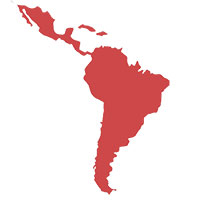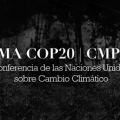The Seven Countries That Will Change The World Today
Hamish M | December 11, 2014.
There’s at least 24 hours to go until the world is set to agree on a way forward to tackle climate change. It’s not too much of an exaggeration to say that the future of humanity hinges on what is about to happen in a few badly ventilated marquees in the dingy suburbs of Lima. In 12 months time, the world needs to sign a legally-binding treaty to drastically cut emissions to stave off the environmental and economic oblivion that unmitigated climate change will deliver. At the time of writing, negotiators are gathering for a marathon session to thrash out precisely what that agreement will look like.
But agreement is still a long way off. Ministers last night articulated what they are looking for going into the next critical hours. There are hundreds of countries at the negotiating table, but realistically, there are only a few movers and shakers who will really pull the strings. In what follows, we present the lay of the land, profiling the seven key players who will need to find common ground, in order to sustain hopes for climate action. And with time fast running out, they will need to find it quickly.
1. United States of America (The Superpower)
The big dog of planet Earth holds predictable sway over the fate of the climate negotiations, and last night delivered a scathing speech blaming poor countries for the grindingly slow negotiations thus far. The key issue at stake for the US is ‘differentiated responsibility’ for climate action. Who has to make cuts? How big should the be? Who pays for it? The US’s long-standing opposition to the Kyoto Protocol, which imposes emissions cuts only on developed states, looms large over the talks as they push for China and India to take the lead in committing to sustainable development pathways. However the US insists that differentiated responsibility is not “threatened with extinction” and that they will shoulder their fair share of the burden. With any global treaty reliant on US ratification, the extent to which developing nations accept its stance may ultimately decide the fate of the Lima talks.
2. China (The Dirty One)
The yin to America’s yang, China is hungry for cheap energy to fuel its economic boom. Sourcing most of its energy from coal, it recently became the world’s largest carbon emitter and economy. Historically wary of foreign intervention in its domestic affairs, China will shoot down any agreement that curtails its growth trajectory, arguing that just as the West got rich on cheap energy, so too should they be able to grow unabated by stringent emissions targets. That said, China is loudly trumpeting its own achievements in climate policy. Chief amongst them is a 45% reduction in emissions intensity by 2020, a goal it insists it will achieve, having demonstrated sincerity on achieving environmental goals in the past. The recent US-China climate deal has spurred hopes of agreement between the two behemoths, but a bilateral agreement is a long way from a binding global treaty, and tension between the two parties over the issue of responsibility is riding high. China is also insisting on a broad treaty in Paris, one that includes adaptation and technology transfer. This last point is unsurprising – the middle kingdom sits on the world’s largest supplies of shale gas, but lacks the technology to access it. Unlocking billions of cubic tonnes of a cleaner energy source will help them reach their ambitious targets for 2020 and beyond, as well as unleashing billions in investment. Expect them to push on this.
3. Canada and Australia (The Pariahs)
The Crabbe and Goyle of the international climate world, these two seem committed to watering down the agreement as much as possible. Though collectively responsible for only about three per cent of global emissions, they are among the world’s largest coal exporters, and derive the vast majority of their energy from their enormous coal reserves. Both are led by conservative governments with strong histories of resistance to environmental concerns. They are possibly the biggest impediment to a unified agreement. Both are paying lip service to the negotiations in Lima, but have indicated to domestic audiences their unwillingness to sign on to a binding agreement in Paris. In their respective addresses, each emphasised the paramount importance of economic growth in a climate treaty. The Canadian environment minister hinted at her reluctance to comply with a treaty, maintaining that any global arrangement must be adapted to “domestic circumstances”. Neither is likely to support an agreement that would compromise their ability to exploit their massive resources wealth. These two may yet prove to be the mice that sink the ship.
4. Bolivia (The Radical)
To some a socialist rogue state hell-bent on destroying the global economy, to many others, the darling of the Latin American left, Bolivia certainly polarises. All agree, though, that Bolivia is one of the most vocal defenders of developing states in the climate negotiations, and a vigorous critic of the refusal of rich nations to accept the majority of responsibility for climate action.
Bolivia slammed developed states for their hypocrisy and inaction:
“If developed countries had complied with their commitments to reduce emissions, we wouldn’t be listening to these apocalyptic predictions of global warming. Those who are responsible for climate change were identified in 1992 and did nothing, and now they are pushing all countries to do something.”
Bolivia proposed a “carbon budget” which seeks to reframe the way responsibility is apportioned. Having quantified the maximum amount of carbon the planet can emit without causing runaway climate change, under Bolivia’s model each country would be assigned a national emissions budget, based on their historical contributions, technological capability, and developmental imperatives. This carbon budget concept seeks to index mitigation action with a broader and more dynamic vision of responsibility in accordance with the original UNFCCC formulation. It is highly unlikely to get up in its full form, but Bolivia’s intransigent insistence on equitable responsibility will likely shape the debate as we enter the final stretch.
5. AOSIS – Alliance of Small Island Nations (The Desperate)
Put simply, there are entire countries on this planet that are sinking into the ocean. The Marshall Islands are barely a metre above sea level, so if the seas rise by 82 cm this century as predicted, the country will cease to exist. A smattering of other islands facing the same fate operate as a unified negotiating bloc under the acronym AOSIS. Tuvalu’s President earlier said that “no national leader in the history of humanity has ever faced this question: will we survive or will we disappear under the sea?”. The Seychelles insisted on the key element of adaptation to be included in any agreement in Paris. With climate change now an inevitability, assisting with rising seas, increasing salinity, and severe storms, is seen as a non-negotiable element. The passion of the AOSIS members, with literally their very survival at stake, cannot be underestimated. The group form a powerful bloc, representing simply by the unavoidable reality that climate change is real: it is happening now, and action is needed yesterday.
6. The EU (The Overshadowed)
The traditional champion of climate action has taken a more combative approach to the Lima talks. Used to seeing itself as a go-between for the fractious China-US relationship, the recent deal between those parties has undercut its accepted role in the negotiations. Perhaps as a result, the EU has adopted a more classically conservative developed-country stance, insisting that the burdens be universally shared. The new EU Climate Commissioner argued that distributing responsibility according the 1992 definitions of developed-developing was no longer an option. The principles of the convention must be interpreted in an “evolving and dynamic way”. In calling for the simplification and streamlining of the text, he implicitly rebuked developing nations for criticising the original draft text as being disproportionate and biased.
7. France (The Would-Be Saviour)
The hosts of next year’s historic climate summit are anxious for COP21 to be a resounding success. A source within the French delegation confirmed to The Verb that the French ambassador to Peru held a special meeting with French negotiators this week, urging them to push for consensus in Lima. The French foreign minister claimed that the Lima talks were marked by both urgency and hope, underscoring both the human costs associated with, for example, the typhoons in the Philippines, but also emphasising the strides made in recent weeks. The EU has lead the world in announcing 2030 emissions reduction targets, and France itself has contributed an impressive US$1 billon to the Green Climate Fund. We can expect France to be guiding the EU in pushing for consensus around issues of responsibility and adaptation amongst the feuding blocs.
The Way Forward
The next 24 hours will either set the stage for a game-changing agreement that unites the world in climate action, or unravel the progress made since Copenhagen. The co-chairs of the negotiations have set tonight as the deadline for an agreement, but given precedent and the earlier inefficiency, coupled with the parlous state of the negotiations, it is likely that the negotiations will extend.
French foreign affairs minister Laurent Fabius laid down the gauntlet: “The way to have success in Paris is to have success in Lima. The future is in your hands my dear colleagues.”
As we edge closer towards a decision in Lima, the world can only watch and hope those hands are safe ones in which to dwell.













comment